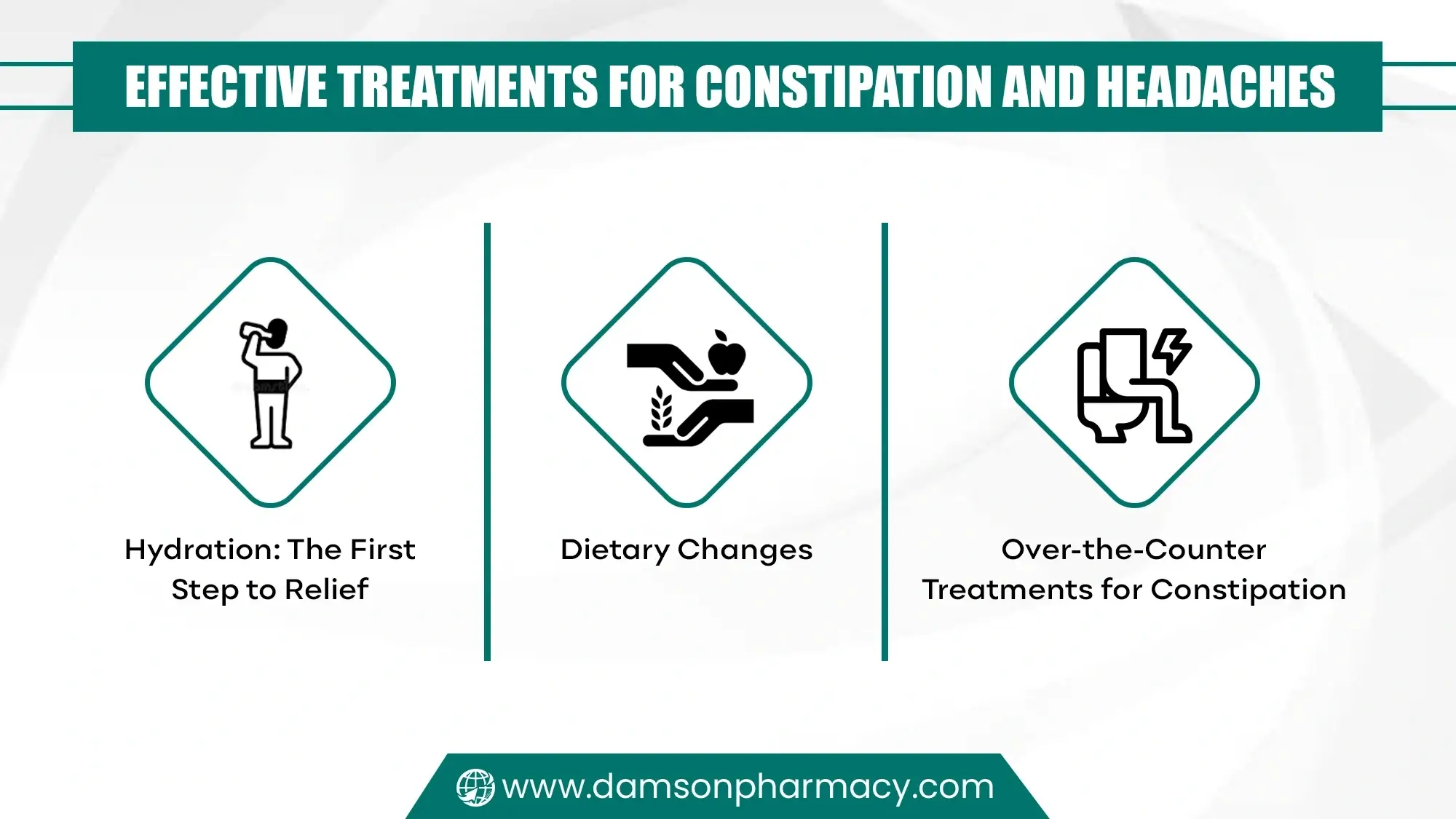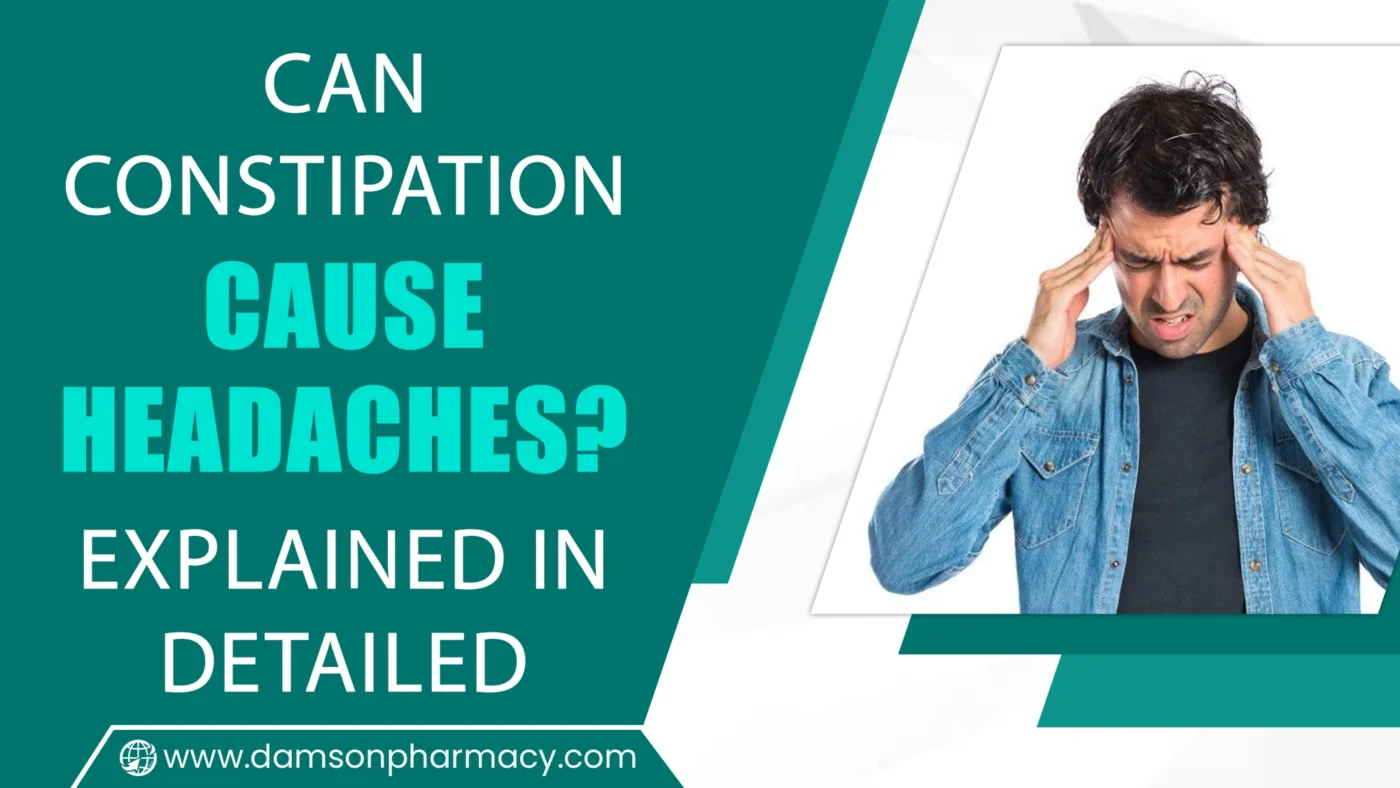Can Constipation Cause Headaches? Explained in Detailed
Constipation cause headache and most people may not realize the connection between the two prevalent illnesses. Although constipation is classically regarded as a gastrointestinal disorder, it has far-reaching effects on the body, including resulting in pulsating headaches.
In this article, we will explain how constipation results in headaches, why there exists a connection, and how you can manage the two conditions. Knowledge about how these two problems relate to each other will assist you in determining the proper treatment to alleviate pain.
How Can Constipation Cause Headache?
Constipation may cause headaches by inducing a series of physiological reactions that impact the entire body. Constipation in the body may cause increased internal pressure, especially within the digestive system. This pressure may result in tension and pain, which normally manifests as headaches.
Dehydration and Headaches
Dehydration is one of the most common connections between headaches and constipation. If the body does not have water content to facilitate the movement of waste in the intestines, constipation will be felt.
Dehydration also predisposes the body to headaches since a deficiency in water can cause the brain to contract and shrink, leading to pain. This brain contraction can lead to headaches. Correct hydration is of utmost significance, along with regular fluid intake, to prevent the headache symptoms that come with constipation.
Toxins and Constipation-Induced Headaches
Another major reason that Constipation brings about headaches is because of the buildup of toxins within the body. If the waste is not removed from the body, it can result in the buildup of harmful substances within the bloodstream.
These toxins can cause inflammation and influence brain activity, thereby developing headaches. Apart from bringing headaches, these toxins can also cause fatigue, irritability, and overall discomfort.
The Role of Pain Relievers in Constipation and Headache Relief
- For most people who have Constipation and Headaches, painkillers will appear to be a ready answer for instant relief.
- Painkillers can give temporary headache relief due to constipation but do not address the cause of the problem.
- The use of painkillers regularly for chronic headaches can actually make constipation worse by decreasing the motility of the bowels.
- It goes on to form a vicious circle, and headaches and constipation are more difficult to control in the long run.
- If you are taking medications such as Pain O Soma 500 or other painkiller drugs, be careful as these are sedatives to the digestive system.
- Sedative action of drugs like these can prolong bowel movements, worsening constipation.
- You have to harmonize relieving the pain with curing the primary cause of constipation so that relief is going to be durable.
- For the sake of lasting relief from constipation and headaches, treat them simultaneously instead of just depending on painkillers.
Should You Take Pain O Soma 500 for Constipation-Induced Headaches?
If you are experiencing Headaches as a result of Constipation, you need to be extra cautious about the medications you consume. Pain O Soma 500 is a muscle relaxant and is commonly prescribed for pain relief. Although it may relieve headache pain, it can also disrupt bowel function.
Muscle relaxants like Soma 350 can occasionally slow down the digestion process and, hence, worsen constipation. For individuals who are already constipated, this creates an even more unpleasant situation.
If you are taking pain drugs for Headaches that are caused by constipation on a regular basis, you must see a physician to find other ways of addressing the issue. Treating the cause—constipation—will eliminate the headache without relying much on medication that may even aggravate it.
Effective Treatments for Constipation and Headaches
The final respite is the most effective remedy for headaches and constipation when taken together. Since painkillers can only effectively stop the suffering of a headache temporarily, eliminating the underlying constipation ensures that the headaches come to an end once and forever.

Hydration: The First Step to Relief
Consuming plenty of water is one of the simplest and most effective ways of managing Constipation and Headache. Water softens stool and makes it easy to pass, therefore avoiding constipation. Consuming water also avoids dehydration and headaches.
Drink at least 8 glasses of water per day and minimize consumption of caffeine and alcohol, which dehydrate the body even more.
Dietary Changes
High fiber intake can also help maintain regular bowel movements and prevent constipation. Fruits, vegetables, and whole cereals are good sources of dietary fiber and can help maintain normal bowel movements.
Fiber can also retain and pass out toxins from the body, thereby reducing the frequency of toxin-induced headaches. Use probiotics as a part of your diet, which helps in the normal functioning of the gut and preventing constipation.
Over-the-Counter Treatments for Constipation
If a change of diet is not adequate to relieve constipation, turn to taking over-the-counter medication, such as fiber preparations or stool softeners. They will aid in stimulating regular bowel movements and relieve the pressure that normally causes headaches.
Although over-the-counter medications are very effective against single cases of constipation, it is advisable not to use them on a regular basis without consulting a healthcare practitioner.
When to Seek Medical Help?
If your Constipation Headache symptoms are lasting or getting worse after all the efforts you’ve been making to control them at home, then it is time to visit a health professional seeking advice for constipation cause headache.
Chronic constipation may eventually cause such complications as hemorrhoids, gastrointestinal problems, and additional headaches. Likewise, if you end up using pain drugs too often without addressing the actual cause, it may ultimately result in medication overuse headaches that are not simple to treat.
The physician may prescribe more direct treatments, including prescription medicine to treat headaches or constipation. They can also provide guidelines on how to treat pain effectively and how to avoid both diseases in the future.
All About Soma 350 Tablet
- Soma 350 is an over-the-counter muscle relaxant that is primarily prescribed to relieve pain and discomfort caused by muscular injury or spasms.
- The active ingredient carisoprodol in Soma 350 induces action in the central nervous system to relieve muscle tension and pain.
- Soma 350 is typically prescribed for short-term use since muscle pain or injury is effectively handled with it.
- The medication is typically given orally, with the standard daily dose of 350 mg repeated up to 3 times per day, based on the severity of the condition.
- Soma 350 is a sedative in nature and can produce drowsiness, dizziness, and feelings of relaxation.
- Though useful in the relief of pain in muscles, it has to be used with caution because it is liable to lead to addiction and cause dependence if taken for prolonged periods.
- One needs to use the provided dosage and avoid exceeding the amount recommended to avert potential side effects or problems.
- Soma 350 is not to be used with alcohol or other sedative drugs as it enhances side effects such as drowsiness and breathing difficulty.
- It is always important to consult a doctor prior to the use of Soma 350, particularly if you have a medical condition.
Online Pharmacy Store: Convenient Solutions for Relief
For those looking for effective treatments for constipation and headaches online pharmacies provide the convenience of buying over-the-counter and prescription drugs from home.
Damson Pharmacy provides a range of treatments for headache relief and constipation, so our customers can have access to high-quality, trusted medications. From painkillers to stool softeners, or other specialist treatments, we have something to help you manage your health.
Conclusion
Briefly, constipation cause headache and it is important to understand the connection between them for proper management. With the removal of constipation by fluids, diet, and good drugs, you can avoid headaches from causing trouble.
Proper use of painkillers and avoiding the sole use of them can also prevent you from worsening the underlying disease. Consult your doctor for proper management of both conditions and optimal overall well-being.
With the correct treatment regimen, you can end the cycle of constipation-induced headaches and enjoy a better life. For more information on these items and treatments, visit Damson Pharmacy, your reliable online pharmacy store, for all types of healthcare choices.
Reference

